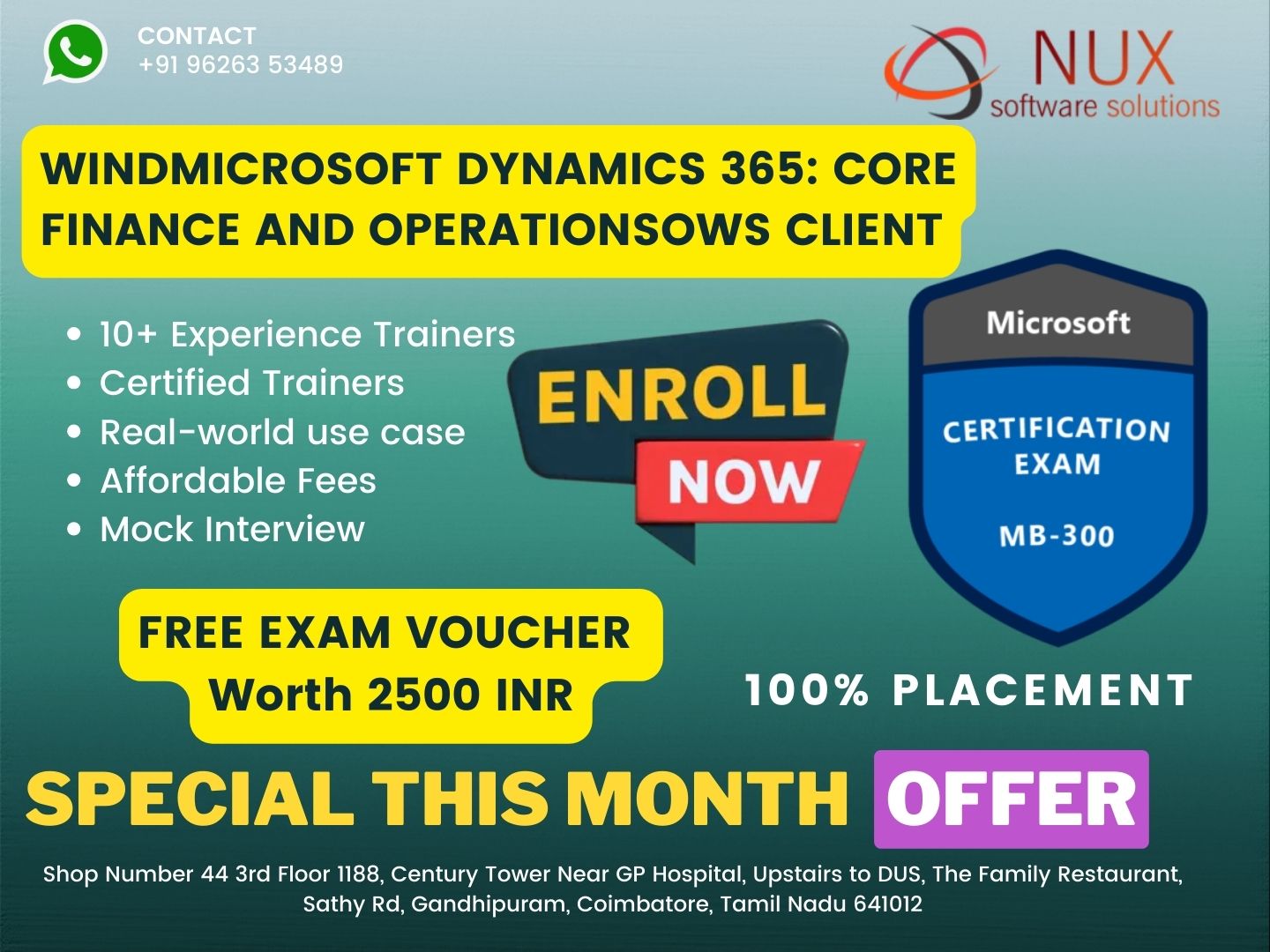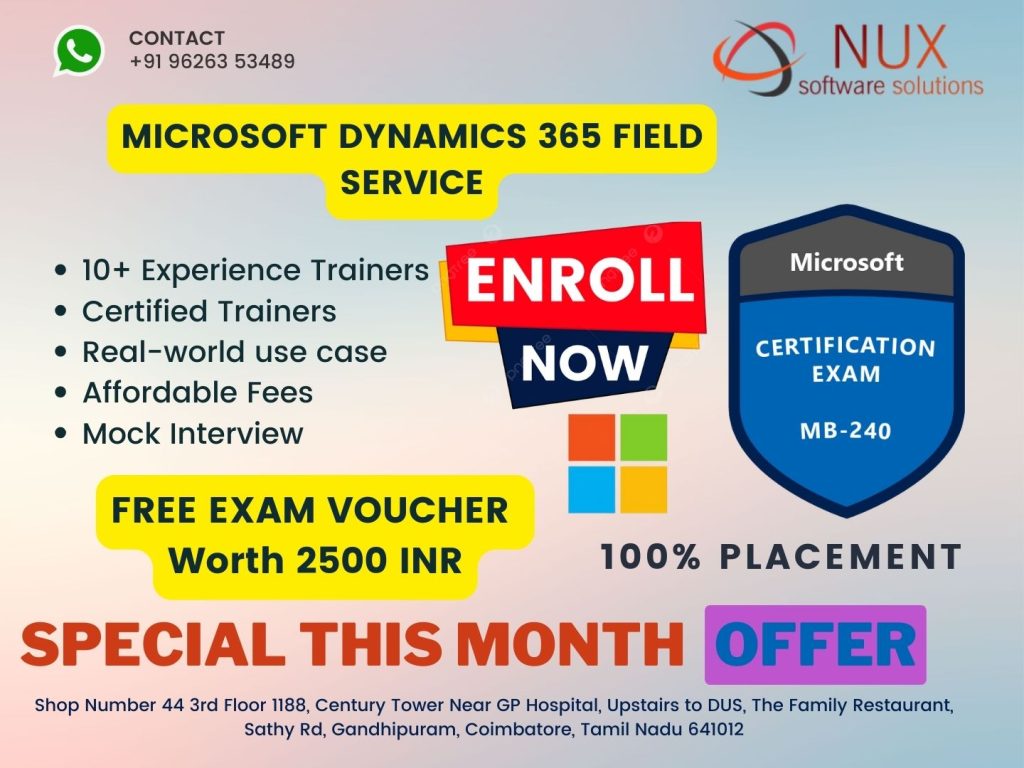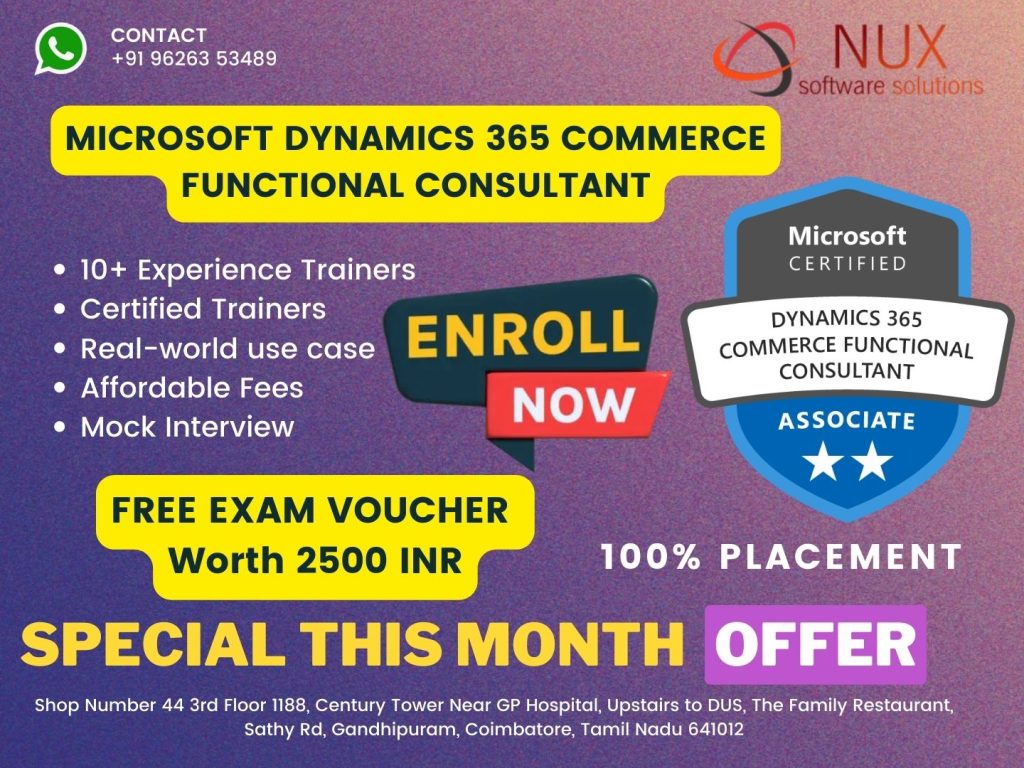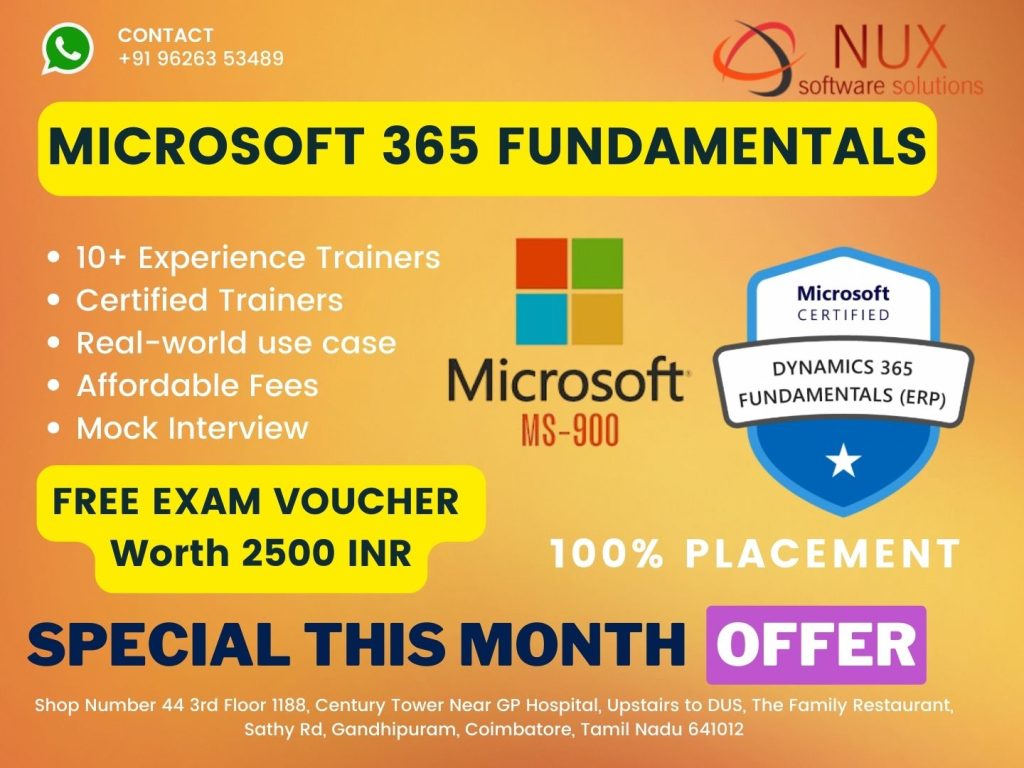Microsoft Dynamics 365 Core Finance and Operations – MB-300 Training and certification in Coimbatore

Microsoft Dynamics 365 Core Finance and Operations (MB-300) Training and Certification in Coimbatore
Take the first step toward mastering enterprise resource planning (ERP) with our Microsoft Dynamics 365 Core Finance and Operations – MB-300 Training in Coimbatore. This course is ideal for professionals aiming to work with Dynamics 365 applications focused on finance, supply chain, and operations.
The MB-300 certification serves as the foundation for all Finance and Operations roles within Dynamics 365. It provides essential knowledge of the platform, application lifecycle management, user interface customization, and system integration—making it an essential credential for functional consultants, solution architects, and ERP specialists.
Why Choose This Course?
Microsoft-Aligned Curriculum tailored to the MB-300 exam objectives
Hands-On Experience with Dynamics 365 F&O platform and modules
Suitable for Multiple Roles – consultants, analysts, and developers
Strong ERP Foundation for advanced certifications like MB-310, MB-320, MB-330
Classroom and Online Options with flexible schedules
Course Highlights
Understanding Dynamics 365 Finance and Operations apps architecture
Navigating the user interface and using operational workspaces
Data management and entity import/export in F&O
Configuring security, roles, and workflow management
Building business processes using Power Platform
Lifecycle Services (LCS) and application deployment
Monitoring performance and diagnostics
Integration, automation, and reporting tools
Who Should Enroll?
Dynamics 365 consultants and ERP professionals
IT professionals transitioning into finance and operations roles
Business analysts supporting supply chain, manufacturing, or finance departments
Candidates preparing for the MB-300 certification
Anyone aiming for end-to-end ERP expertise using Microsoft Dynamics
Benefits of This Training
Instructor-led sessions by certified Dynamics 365 ERP experts
Real-time lab access and guided projects
Mock exams and certification preparation
Resume, LinkedIn, and interview coaching
Course completion certificate with placement support
Get certified and become an expert in Microsoft’s powerful ERP solution with our MB-300 Training in Coimbatore. Build a solid understanding of how businesses run their core financial and operational functions using Dynamics 365—and launch a rewarding career in enterprise IT.
MB-300 Course Syllabus
Modules
Describe finance and operations apps and extend apps by using Microsoft Power Platform technologies (20-25%)
Identify common apps, features, and functionalities - Describe uses cases for and capabilities of workspaces and mobile workspaces- Describe global address book features and their use cases
- Identify available inquiry and report types
- Describe use cases for the Business document management and electronic reporting features
- Perform searches, and filter data
- Describe the main navigation elements
- Create, export, and import personalizations
- Create, manage, and publish saved views
- Create and maintain record templates Extend app functionality by using Microsoft Power Platform technologies - Identify use cases for Microsoft Dataverse
- Identify use cases for Microsoft Power Apps
- Identify use cases for Microsoft Power Automate
- Identify use cases for Microsoft Power BI
- Identify use cases for Microsoft Power Virtual Agents Describe capabilities of finance and operations apps - Describe use cases for apps in the finance and operations portfolio
- Identify capabilities of Dynamics 365 Finance
- Identify capabilities of Dynamics 365 Supply Chain Management
- Identify capabilities of Dynamics 365 Commerce
Configure administrative features and workflows (30-35%)
Implement security - Distinguish between roles, duties, privileges, and permissions- Manage security roles
- Describe segregation of duties
- Describe record-level security and Extensible Data Security (XDS) policies
- Describe and use the security diagnostics for task recordings tool
- Maintain users Design and create workflows and describe business events - Describe use cases for workflows
- Design and create workflows
- Configure workflow properties, tasks, approvals, and elements
- Configure queues and workflow parameters
- Troubleshoot workflows
- Manage workflow versions
- Describe use cases and capabilities for business events
- Describe use cases for Data events Configure organization administration features - Set up and configure legal entities and operating units
- Configure number sequences
- Configure organization hierarchies
- Configure document handling for attachments
- Create and maintain email templates Configure system administration features - Configure email (SMTP/Exchange)
- Set up and monitor batch jobs
- Set up alerts
- Configure document printing
Manage finance and operations data (20-25%)
Manage data - Describe use cases for the data management framework- Describe use cases for projects, data entities, and templates
- Describe use cases for the dual-write feature
- Describe use cases for Entity store Describe the data migration process - Identify common migration scenarios and tools in finance and operations apps
- Identify relevant data entities and elements based on given scenarios
- Identify data migration requirements
- Copy configuration data between legal entities by using the data management framework
- Use Microsoft Excel Workbook Designer and the microsoft Dynamics Office add-in to maintain data Prepare data for migration and migrate data to Finance and Operations apps - Identify types of data including master, transactional, reference, parameter, and document data entities
- Identify and extract source data
- Generate field mapping between source and target data structures
- Import or export data by using the data management framework
- Support the transition between the existing and migrated systems
- Perform a test migration and validate output from the process
- Implement data task automation
Validate and support solutions (15-20%)
Test solutions - Describe types of testing including unit, regression, functional, and end-to-end testing- Describe capabilities of available testing tools
- Track work items throughout a project implementation by using Azure DevOps
- Create test cases and test plans by using Azure DevOps
- Create test scripts by using Task recorder and upload scripts to Business process Modeler (BPM) or Azure DevOps
- Automate and manage test cases by using the Regression Suite Automation Tool (RSAT) Describe and use Lifecycle Services (LCS) tools - Identify use cases for project asset libraries and shared asset libraries
- Describe environment purposes and topologies
- Differentiate between Tier 1 environments and other tiers
- Maintain BPM libraries
- Describe the types of environments including sandbox, test, gold, and production
- Identify, report, and resolve issues by using Issue Search and creating support tickets
- Report production outages
- Describe the Dynamics 365 One Version experience
- Describe the environment update process



